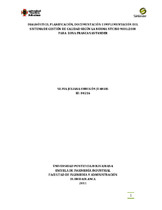| dc.contributor.advisor | Rangel Arias, Libia Rosa | |
| dc.contributor.author | Obregón Juanias, Silvia Juliana | |
| dc.coverage.spatial | Seccional Bucaramanga. Universidad Pontificia Bolivariana. Escuela de Ingenierías. Facultad de Ingeniería Industrial | spa |
| dc.coverage.temporal | 2011 | |
| dc.date.accessioned | 2014-09-09T17:35:12Z | |
| dc.date.available | 2014-09-09T17:35:12Z | |
| dc.date.created | 2011-12-06 | |
| dc.date.issued | 2014-09-09 | |
| dc.identifier.uri | http://hdl.handle.net/20.500.11912/1576 | |
| dc.description | 112p.: (pdf); il; gráficas; tablas; anexos | spa |
| dc.description.abstract | Teniendo en cuenta la importancia y el impacto que generan los Sistemas Integrados de Gestión en la competitividad de las organizaciones, Zona Franca Santander, Primera Zona Franca Permanente del departamento, perfilada como una plataforma de inversión en Offshoring & Outsourcing de Latinoamérica, ha decidido implementar un Sistema Integrado de Gestión, donde se cumplan los parámetros establecidos en las normas ISO 14001:2004, Sistema de Gestión Ambiental, ISO 9001:2008, Sistema de Gestión de Calidad y OSHAS 18001:2007 Sistema de Seguridad y Salud Ocupacional. Este documento describe las actividades que se desarrollaron para el “Diagnóstico, planificación, documentación e implementación del Sistema de Gestión de Calidad según la norma NTC ISO 9001:2008 para Zona Franca Santander”, el cual busca con su implementación mejorar la competitividad de la organización respecto a la satisfacción de sus partes interesadas y el mejoramiento continuo de sus procesos. El proyecto se desarrolló en cuatro etapas comprendidas por: diagnóstico inicial, con el fin de identificar el estado de la organización frente al cumplimiento de los requisitos establecidos en la norma ISO 9001:2008; la planificación del sistema, para dar cumplimiento a los requisitos y mantener la integridad del mismo; el diseño de los parámetros para la elaboración de los documentos de acuerdo a los requisitos de la norma y la organización; la implementación del Sistema, paralela a la documentación del mismo por medio de reuniones del Comité de Calidad en donde se discutieron y divulgaron las directrices y se sensibilizó al personal en la importancia y el impacto del Sistema. El principal aporte del proyecto a la organización es la identificación de los procesos que hacen parte del Sistema Integrado de Gestión y su aplicación en la organización, la 17 secuencia e interacción de los procesos, la documentación y los métodos de control y seguimiento establecidos por el Sistema para garantizar la eficacia del mismo. De igual forma, se logró la concientización y el compromiso del equipo de trabajo frente a la importancia de los procesos en el desarrollo del SIG. | spa |
| dc.description.abstract | Given the importance and impact generated by the Integrated Management Systems on the competitiveness of organizations, Free Santander Trade Zone, as the First Permanent Free Trade Zone at the department, shaped as a platform for investment in Offshoring & Outsourcing in Latin America, it has decided to implement an Integrated Management system, which meet the parameters laid down in ISO 14001:2004, Environmental Management System, ISO 9001:2008, Quality Management System and Safety System OHSAS 18001:2007 and Occupational Health.
This document describes the activities that had been developed for the “Process of diagnostic, design, documentation and the implementation of Quality Management System according to ISO 9001:2008 standard NTC for Free Santander Trade Zone”. This implementation enhances the competitiveness of the organization achieving the satisfaction of its stakeholders and continuous improvement of its processes.
The project was developed in four steps involved by: the initial diagnostic to identify the status of the organization towards the fulfillment of the requirements of ISO 9001:2008; the planning system to fulfill with the requirements and to maintain its integrity, the design parameters to prepare documents according to the requirements of the standard and the strategy to implement the system. While its documentation was happening, the Quality Committee meetings discussed and disseminated guidelines and the work team did awareness of the importance and impact of the quality system.
19
The main contribution to the organization through the project is to identify processes that are part of the Integrated Management System and its application to the corporation, the sequence and the interaction between processes, the documentation and control and monitoring methods suggested by the system to ensure effectiveness. Similarly, the team has become aware of the importance of the processes in the development of SIG. | |
| dc.language.iso | es | |
| dc.publisher | Universidad Pontificia Bolivariana | spa |
| dc.rights | Attribution-NonCommercial-NoDerivatives 4.0 International | * |
| dc.rights.uri | http://creativecommons.org/licenses/by-nc-nd/4.0/ | * |
| dc.subject | Ingeniería industrial | spa |
| dc.subject | Normas técnicas - NTC ISO 9001-2008 | spa |
| dc.subject | Sistemas de gestión | spa |
| dc.subject | Normas técnicas - OSHAS 18001-2007 | spa |
| dc.subject | Salud ocupacional | spa |
| dc.subject | Sistemas de seguridad | spa |
| dc.title | Diagnóstico, planificación, documentación e implementación del sistema de gestión de calidad según la norma NTC ISO 9001:2008 para zona franca Santander | spa |
| dc.type | workingPaper | spa |
| dc.rights.accessRights | openAccess | spa |
| dc.type.hasVersion | publishedVersion | spa |
| dc.identifier.instname | instname:Universidad Pontificia Bolivariana | spa |
| dc.identifier.reponame | reponame:Repositorio Institucional de la Universidad Pontificia Bolivariana | spa |
| dc.identifier.repourl | repourl:https://repository.unab.edu.co/ | |


